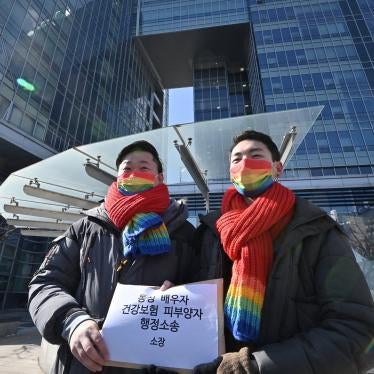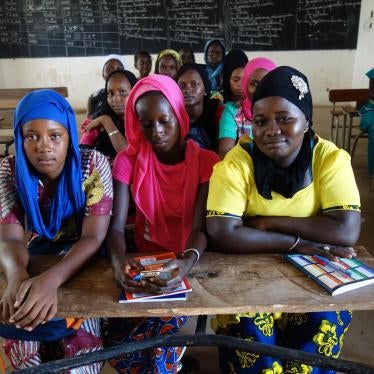(Seoul) – South Korea’s National Health Insurance Service should extend benefits to same-sex partners, Human Rights Watch said in an amicus brief filed before the country’s Supreme Court on May 16, 2024. The agency extends dependent benefits to heterosexual couples who are deemed to be in a de facto marriage, but has refused to extend those benefits to same-sex couples in a similar position.
The Supreme Court is currently considering whether the agency has impermissibly discriminated against a same-sex couple that was refused dependent benefits. In 2023, the Seoul High Court ruled in favor of the couple, concluding that the refusal to extend benefits constituted discrimination based on sexual orientation. The health agency appealed to the Supreme Court.
“The Seoul High Court correctly observed that the health agency’s refusal to recognize same-sex couples is discrimination,” said Lina Yoon, senior Korea researcher at Human Rights Watch. “We hope the Supreme Court will affirm the principle that nobody should be denied benefits solely because of their sexual orientation.”
The couple who brought the case had held a symbolic wedding ceremony in 2019, and one of the men registered his partner with the National Health Insurance Service as his spouse in 2020. The agency later revoked the partner’s dependent benefits following media attention to its effective recognition of a same-sex couple.
Human Rights Watch’s brief examines international and regional precedents for state recognition of same-sex partnerships, the status of lesbian, gay, bisexual, and transgender (LGBT) rights in South Korea, and the growing recognition of same-sex partnerships elsewhere in Asia.
South Korea has not created any framework for recognizing and supporting same-sex couples. The absence of any legal framework or protections for same-sex partners leaves LGBT people with few avenues to protect their relationships with partners and children, to safeguard their shared finances and property, and to access state benefits designed to support couples and families.
The government’s failure to recognize same-sex partnerships falls short of its human rights obligations, Human Rights Watch said. The Office of the United Nations High Commissioner for Human Rights has concluded that UN member states “have a positive obligation to provide legal recognition to couples, regardless of sexual orientation, gender identity and sex characteristics, as well as to their children,” and to extend those benefits offered to heterosexual couples without discrimination.
Among regional human rights bodies, the Inter-American Court of Human Rights has said that states must extend the right to marry to same-sex couples, while the European Court of Human Rights has said that states must create some form of legal recognition and protection for same-sex relationships.
As Human Rights Watch and others have noted, South Korea also lacks comprehensive protections from discrimination on the basis of sexual orientation and gender identity. Despite strong public support for a comprehensive antidiscrimination law, lawmakers have repeatedly failed to enact basic protections that would prohibit discrimination in employment, education, and other areas.
In failing to protect LGBT rights, South Korea is out of step with trends elsewhere in the region. In 2019, Taiwan became the first jurisdiction in Asia to extend the right to marry to same-sex couples, and Australia and New Zealand have subsequently recognized the right to marry as well.
Courts in Japan and Thailand have expressed concern about the lack of partnership recognition in those contexts, and Nepal’s supreme court has extended interim recognition of the right to marry while it considers a marriage equality case.
A growing number of states in the region also prohibit discrimination on the basis of sexual orientation. Australia, Fiji, Macao, the Marshall Islands, Micronesia, Mongolia, New Zealand, Thailand, Tuvalu have prohibited sexual orientation discrimination in employment and other fields.
“South Korea’s lawmakers have failed to provide basic protection for same-sex couples by dragging their feet on nondiscrimination and partnership bills,” Yoon said. “South Korea’s courts now have the chance to uphold the state’s human rights obligations by ensuring that the state does not discriminate in the material benefits it does offer to committed couples.”








